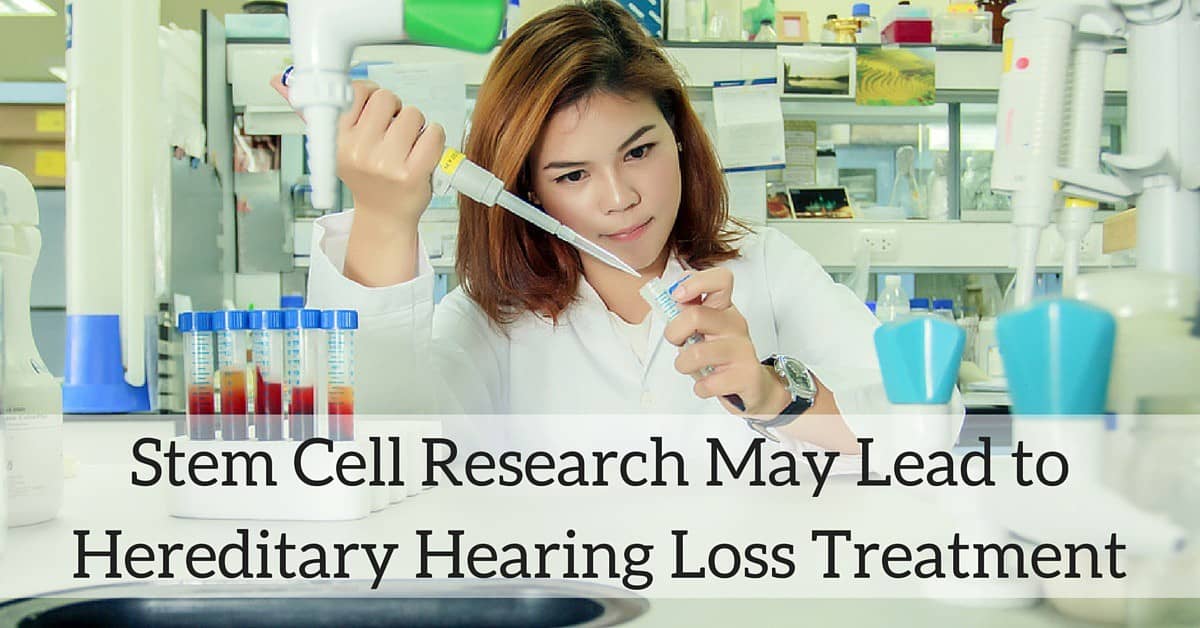Stem Cell Research May Lead to Treatment for Hereditary Hearing Loss
Hereditary Hearing Loss
For people born with sensorineural hearing loss, a type of hereditary hearing loss caused by genetic mutations in the hair cells of the inner ear, or cochlea, a cochlear implant has been one of the best and only treatments for enabling hearing function.
What if doctors could restore the complexity of a fully functioning biological ear from a person’s own skin cells? Or repair a damaged inner ear from within? While hearing aids and cochlear implants can provide valuable access to hearing function, they do not restore the complexity of a fully functioning biological ear.
Promising new research in stem cell therapy within the realm of otolaryngology has the potential to restore normal hearing without any type of prosthetic device, and is thought by many to be the final frontier of restoring hereditary hearing loss.
How Hereditary Factors Affect Hearing
Our sense of hearing relies on many factors within the structure of the ear, but none so much as cochlea hair cells. Ears require inner and outer hair cells to create the electromotile responses needed to enable us to hear.
In acquired hearing loss, these hair cells, both inner and outer, become damaged and their functioning begins to deteriorate.
With hereditary hearing loss, these hair cells, particularly of the inner ear, do not develop properly or at all. Congenital deafness affects approximately 1 in 1,000 children, and about half of these are attributable to genetic causes.
New Research in Stem Cells Linked to Hereditary Hearing Loss
While many therapies using stem cells are geared towards regenerating structures in the recently deafened, new stem cell therapies being developed could theoretically help people who never developed proper inner ear structures at all, or whose cells are completely degenerated.
Researchers at Zhejiang University, Shanghai Jiaotong Universoty, Wenzhou Medical University in China, and Cincinnati Children’s Hospital Medical Center and Emory University in the U.S. are conducting comprehensive studies in Stem Cell Translational Medicine utilizing stems cells derived from human adult somatic tissues such as skin and urinary cells, called IPSCs, which stands for Induced Pluripotent Stem Cells. In previous studies, IPSCs have been generated from tissues of patients with ALS, spinal muscular atrophy, diabetes and other diseases for testing potential to correct disease-specific genes and therapies. This approach led to its application for sensorineural hearing loss.
“If we can find a way to correct gene mutations using stem cells, it might restore the normal function of the hair cells and, thus, the patient’s hearing, too,” said Jin-Fu Want, Ph.D., a lead investigator on the study.
In one particular initial study, the team began by generating lines of stem cells from a hearing loss patient with hereditary hearing loss, her hearing father, and another hearing donor. The line from the genetically impaired patient was then used to correct the mutation, resulting in morphologic and functional recovery of hair cell-like cells derived from the corrected IPSCs.
“In the future, transplantation of these functionally recovered cells may prove to be a promising therapy for deafness resulting from gene mutation,” said Anthony Atala, M.D., Editor-in-Chief of STEM CELLS Translational Medicine and Director of the Wake Forest Institute for Regenerative Medicine. “The authors outline a variety of obstacles that must first be overcome, including finding more efficient methods to derive the large number of cells needed for treatment and developing a method to insert the cells.”
Other studies are being conducted at the University of Sheffield in the U.K., as well as Oxford, Stanford, and Columbia Universities, in addition to those mentioned above.
This promising new research could very well lead to therapies for genetic hearing loss that just might outperform artificial cochlear implants or any other type of prosthetic device! It may be several years before these therapies will be available, but they hold great hope for those born with hearing loss.
Live your life to the fullest! Call (877) 330-2920 to schedule an appointment at one of our locations today!


